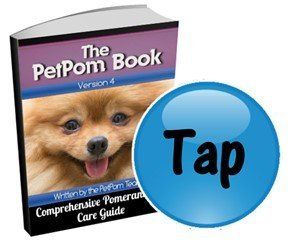Pomeranian Constipation
Overview
What Constipation Is
When a dog is constipated he or she will have trouble pushing out a bowel movement, will not have a bowel movement at all, or may have very small, infrequent movements.
What Constitutes Normal Bowel Movements
Frequency - For most healthy dogs having 1 or 2 stools a day is considered normal. If your Pom has 3, 4 or more stools per day, this would points to an issue with loose stools, or may be
diarrhea. If your puppy or dog has 1 stool every other day (or less) this does point to a constipation problem.
Consistency –
So, what should the feces look like? For canines, a healthy stool has the consistency of dough.
Hypothetically, if you were to pick it up (and maybe you do, if you take your Pom for walks and bring along a doggie waste bag) you would be able to pick it up in one piece.
It would be soft but it would stay together as one piece. If the stool is very hard, this points to constipation. If it comes out like a splattering of hard, tiny rocks, this also is a sign of constipation.
Color-
While we are speaking of dog poop, why don’t we quickly talk about what the normal color is of Pomeranian poop? The color of it is not directly related to constipation problems; but by noticing this element, you can learn a lot.
The normal healthy color of canine stool is a medium chocolate brown. Now, if you are feeding your Pomeranian a manufactured food that has a lot of artificial coloring in it, those colors can pass through the body and wind up in the poop.
So, if you see some green, blue and/or red flakes and for some reason you are feeding your Pom (yikes!) yucky food with a high concentration of coloring, this may be the reason.
** Note-
If you do not feel comfortable with what you are offering your Pom for food and snacks, do please take a moment to read our Food section.
Red-
Take note of any bright red coloring – This could be blood in the stools. Blood may appear from another medical issue…
Or blood may be seen when a Pomeranian is constipated, as hard bowel movements may tear at tissue as it is pushed and stressed to be released. Either way, bright red is a concern.
Very dark black –
If the stool is what is referred to as ‘tarry black’, a very dark, slick looking color- this can point to blood as well.
If a Pomeranian (or any other dog) has issues in the gastrointestinal tract, it can cause the stools to be dark like this with ‘old’ blood. This is a concern to bring to the attention of the vet.
Super light tan -
This can point to a possible issue with the liver, so this is another issues to bring to the attention of a vet.
Shape –
The shape should be like that of a ‘log’. It can also be normal for a dog’s poop to sort of spiral out…it may spin around (like a soft serve ice cream being released) and end up being a corkscrew little mound.
As long as the consistency is like that of dough (as described above), this can be considered normal.
When a Pomeranian is constipated, the feces will be small. One pebble may pop out…and then another.
Causes of Constipation
What can cause a Pom to strain and have trouble pushing out his or her poop?
#1
The most common reason dehydration. Did you know that poop is 75% water? It is! So, if your Pom is not drinking enough, not enough water will make it down into the intestines and this can cause hard poop that is difficult for a Pom to push out.
#2
Ingestion of a foreign substance - This can range from a pebble, to a coin..and includes eating grass.
#3
Medication Side Effects – Is your Pomeranian taking any prescribed medicine? All sort of medications can cause constipation. Most commonly it will be antihistamines for allergies. Iron supplements can cause problems with the stool as well.
#4
The fourth most common reason for Pomeranian constipation is, surprisingly, habit. Yes, a dog can develop a habit. This can happen if a puppy or dog is left home alone for long periods of time and holds back the urge to go to the bathroom.
A dog can also hold back bathroom needs when in a new place… like a boarding kennel or while traveling on an airplane or for a long car trip.
#5
For older, senior dogs, a diet of only dry food can cause constipation.
Signs & Symptoms
If a dog is constipated, he will strain to have a bowel movement or there will be infrequent bowel movements. This pages discusses "normal" constipation issues and problems.
If your Pom also has vomiting, a very swollen tummy, reluctance to eat, weakness, bleeding from the rectum or any other troubling symptoms, please bring your Pomeranian to the veterinarian ASAP.
Prevention
Let’s look at the steps that you can take to prevent your Pomeranian from suffering with constipation.
1- Give lots of water -
Some dogs are picky with their water, they will not lap at old, stale, warm water. So, be sure to keep that water bowl fresh! Use filtered tap water (unfiltered tap water can contain also sorts of ‘nasty’s’ that can cause allergies, stomach upset and coat issues). Be sure to keep it refilled throughout the day with cool/cold water.
Also, have 2 bowls (or even more), so that you can easily throw one in the dishwasher or set aside in the sink and offer water in a nice clean one. Food particles from food are easily transferred to the water dish... So, the need to clean bowls often is something that owners must be aware of.
Note:
While we are on the topic of bowls, please be sure to never use a cheap plastic bowl for food or water. The bowls should be stainless steel or ceramic. Plastic colored bowls can leak coloring and this will eventually affect the coat and cause staining to the facial hairs. See more about
the best bowls for Poms.
One hot days or on days when your Pomeranian exercises a bit more than normal, be sure to offer more water. The amount of water that a dog needs changes with the weather and with his activity levels. So, to avoid constipation and for healthy bowel movements, enough water is a must.
2- Puppy proof your house even if your Pom is an adult.
Please remember to routinely ‘puppy proof’ your house. Even if your Pom is an adult! Curious (or bored) Pomeranians can very easily gobble up small items such as paper clips, paper, a coin or a hair pin.
3- Do not let your Pom eat grass.
Grass is not a food and is considered to be a foreign substance. Keep an eye on your dog and do not allow him or gobble up the lawn while outside. While many dogs do eat grass, it is not healthy to do so. Pebbles may be ingested, which can cause a blockage and then constipation.
Also, as a side note, many lawns hold in polluted rain water, lawn care chemical, stinging insects… So, keep an eye on your Pomeranian and don’t let him or her eat at the blades. Note: Lack of proper nutrients is the #1 reason why a dog will eat grass. Offer greens in a healthy way!
4- Offer a well-balanced, healthy diet.
Look to our feeding section for much more detail. In general, you will want to offer a high quality commercial food or to home cook.
Once in a while, add some greens. Green beans and peas are 2 great ingredients that can be mixed into meals to offer more ‘greens”.
5- If your Pomeranian is constipated and is also taking medication for allergies, check with the veterinarian. If the constipation is very bad, switching to a new medication or lowering the dose may be needed. He may also suggest adding a new medicine to treat your Pom’s constipation.
6- If your Pom is home alone for most of the day, be sure to offer a happy, comfortable environment so that he or she can feel more comfortable with having a bowel movement. If confined to a very small area, your dog may hold back the urge.
Note:
Never, ever leave a Pom home alone
in a crate. Crates are good for bringing your Pom to the vet. But they are NOT for keeping a dog locked in such a tiny space all day.
Obtain canine gates or an indoor canine playpen. Set up a nice area where your Pom can hop around, play with toys, head over to a bed to rest AND an area for bathroom needs.
Your Pomeranian may not ‘hit the mark’, but that is okay! You’re goal is for your dog to learn to go to the bathroom outside. So, put down some pee pads in the gated off area, and your Pom may or may not aim correctly .
BUT, importantly, you are allowing your Pomeranian the opportunity to push out a bowel movement, in a spot that is spaced aside form the food, toys and sleeping area…And helping to prevent constipation.
7- For an older, senior Pom, beware of that dry diet that can cause constipation. If you feed kibble, allow it to soak in water for a good fifteen or twenty minute before feeding. If you offer home cooking recipes for your Pomeranian, this is great as the food will already be moist.
8- If your Pom gets constipated while traveling
for a long distance in the car, be sure to pull over every couple of hours. Keep your dog on leash. Allow your Pomeranian to stretch his legs, have a drink and a snack and take a bathroom break.
Treatment
All of the above prevention steps should help to treat minor to moderate Pomeranian constipation problems.
If those steps do not work, one of the most effective at-home remedies is a bit of pumpkin. This helps with both constipation or diarrhea.
Be sure to only obtain 100% real pumpkin (not the pie filling), and this can be either puree or pumpkin pieces that you can dice up.
Just add 1 teaspoon to each meal, and see if this clears things up within 2 to 3 days.
For stubborn constipation, some dogs respond to milk. However, this can cause upset stomach. Giving a good amount of milk to a dog that does not have constipation will often cause diarrhea.
If you want to try a bit of milk, add 1/4 cup of warmed milk to a meal (or just in a drinking bowl if he or she likes the taste) to loosen the bowels. Stick with this small amount so that your puppy or dog does not develop an upset stomach.
If the problem will not go away, it will be time to bring your Pom to the veterinarian. A mild laxative may be prescribed. Note:
NEVER, ever try to give a dog a laxative meant for humans. This can be fatal!
Laxatives prescribed by a vet that contain lactulose are very safe and effective.
If you are concerned that your Pomeranian has some sort of obstruction that is not allowing the poop to come out, this is an emergency situation. Bring your Pom to the vet ASAP.
Things to do now:
See what's inside the PetPom eBook
- Simply the most comprehensive Pomeranian book that exists. NOW IN PRINT!
Become a free PetPom Member
- This allows you to receive a friendly message when new pages have been added to the site and keep you up-to-date on all new Pom information.
You will also receive a free Welcome Booklet.
You May Also Like:
The Best Supplies to Care for a Pomeranian
- From carry slings, to the right playpens to help with separation anxiety, to toys to help with boredom; everything a Pom needs to stay happy.
Helping a Teething Pom Puppy
- How to help your pup during this difficult time.




